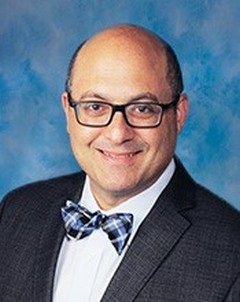
Deep Brain Stimulation has been FDA approved for treatment of Parkinson’s disease and Essential Tremor since 1997. I am frequently asked by Parkinson patients whether they are good candidates for the procedure. Properly selected, patients can enjoy great improvement in symptoms as well as significant reduction in medication. So what makes a good candidate? And what factors would indicate a poor candidate for the procedure? Let’s examine some of the factors that are used to make these decisions.
First, it must be considered if the patient has Parkinson’s. The cardinal symptoms: resting tremor, stiffness, slowness, and postural instability should be present to varying degrees. Associated symptoms, such as a reduction in facial expression, low monotonous speech and small handwriting (micrographia) can also be considered. A robust response to dopamine replacement (eg. carbidopa-levodopa) is essential.
There should be symptoms or side effects which are not well remedied by adjustment in medication. These may include dyskinesia, On-Off fluctuations (fluctuating stiffness and dyskinesia, with a reduction of normal movement) or dystonia.
Other symptoms may suggest that DBS is not a good fit. Postural instability or freezing which is not remedied by medication, Anticoagulant medication such as warfarin, significant depression, dementia or hallucinations.
Evaluation
If it seems like this is a good fit for you, the next step is to make an appointment with the neuromodulation specialist. Here is what to expect. There are three main steps in considering a patient for deep brain stimulation. The first is the United Parkinson Disease Rating Scale (UPDRS). This is a questionnaire about living with Parkinson’s, along with a formal exam. This is done first on medication, and then repeated on another day without medication. There should be at least a 30% improvement with the medication. Then a brain MRI is scheduled. This imaging will be examined by the neurologist as well as the neurosurgeon. While age itself is not a contraindication to the procedure, significant brain atrophy (which increases with age) would preclude candidacy. Finally, a formal neuropsychology exam will be scheduled. This is to clearly and objectively document whether there is any dementia or depression, and to what degree, to better predict a good outcome.
Expectations
It is important for patients and their families to understand what deep brain stimulation has to offer, and what should not be expected from the procedure. The benefit is similar to the best that dopamine replacement has to offer. Reports suggest that patients enjoy 6 additional hours of “On” time – that is, time of good movement without side effect. There are also reduced motor fluctuations throughout the day, as well as a reduction in medication. The device, like the medication, provides symptomatic therapy. That is, there is no treatment for the underlying disease. The symptoms will continue to slowly progress over time. This will require visits to the neurologist to adjust the settings. In addition, the battery of the device will eventually require replacement. The battery may last between four and ten years, depending upon the settings and the device chosen. This is, of course, a surgical procedure, and with any procedure there may be side effects. There is only a 2-3% risk of serious side effects, such as bleeding or infection. There is a small risk (around 5%) that the lead or wire may be misplaced or become dislodged –this would require a second operation to replace the lead. Finally, there may be side effects to the stimulation itself. Tingling in the arm, electrical jolt on initial stimulation, or slow and slurred speech may be seen, and can be helped with a change in programming. Usually patients who are considering Deep Brain Stimulation are taking a large number of medications, multiple times a day. It is common to enjoy a vast reduction of medication and a simplification to the schedule.
If you wish to have an evaluation for Deep Brain Stimulation, please call the Memorial Neuroscience Institute 305-682-2670 for an appointment with me, your neuromodulation specialist.






